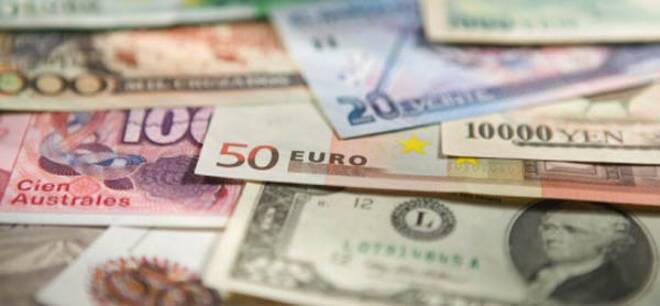Advertisement
Advertisement
EUR/USD Daily Technical Analysis for October 18, 2017
By:
The EUR/USD edged lower following a softer than expected German ZEW report and a better than expected U.S. trade report. The gains seen in import prices
The EUR/USD edged lower following a softer than expected German ZEW report and a better than expected U.S. trade report. The gains seen in import prices were offset by a soft chain store sale report, but subdued European inflation provides the ECB with room before they need to remove quantitative easing.
The EUR/USD moved lower but settled off the lows of the session, and is hovering slightly below the 10-day moving average which is seen as resistance at 1.1781. Target support is seen near the 100-day moving average at 1.1637. Momentum is neutral as the MACD (moving average convergence divergence index prints in the black, but the trajectory of the MACD histogram is flat which reflects consolidation.
The U.S. trade price report beat estimates
The U.S. trade price report beat estimates with big September headline gains of 0.7% for imports and 0.8% for exports, with a lift from a hurricane-related gain for petroleum import prices and surprising strength in nonagricultural export prices, though food export prices fell. Even without storm disruptions, there was a resumed trade price climb from lows in early-2016 with strength skewed toward exports. A declining value for the dollar since December has provided support for trade prices, alongside recovering growth abroad and stabilization in global inventories, though the boost to oil prices from OPEC production restraint has been capped in 2017 by soaring U.S. shale output. Export prices ex-agriculture and import prices ex-petroleum are poised for 2017 gains of 2%-3%, following respective 2016 increases of 1.4% and 0.2%, but big respective declines of 5.9% and 3.7% in 2015, 2.8% and 0.1% in 2014, and 0.4% and 1.1% in 2013.
U.S. Chain Store Sales Declined
U.S. chain store sales fell 2.2% in the week ended October 14, after a 0.6% dip previously. Sales have been very choppy in recent weeks amid the hurricanes and various seasonal trends. However, year-over-year trends have been more smooth, posting a 1.7% year over year rise versus the prior 2.0% year over year pace, and 1.6% year over year before that.
The German ZEW Was Softer than Expected
The German ZEW investor confidence rose to 17.6 from 17.0, less than anticipated, but the second consecutive rise finally lifted the three months trend rate, if just slightly, for the first time since June. The current conditions indicator fell back to 87.0 from 87.9. Confidence for banks and insurance companies dipped, while investors are less pessimistic about the automobile industry. Expectations for inflation picked up for the Eurozone, as well as Germany, but despite these expectations for short-term interest rates fell back for a third consecutive month.
Eurozone September Inflation is Subdued
Eurozone September HICP confirmed at 1.5% year over year, as expected. Prices rose 0.4% month over month and core inflation was confirmed at 1.1% year over year, down from 1.2% year over year in the previous month. Energy price inflation accelerated and the rate excluding energy rose to 1.3% year over year from 1.2% year over year. The average headline rate remains clearly below the ECB’s upper limit for price stability and while divergence even across the big four Eurozone countries remains pretty large, the ECB clearly is not convinced yet that inflation is sustainably moving higher.
German draft outlines future EU-U.K. relationship post Brexit
While the EU summit this week is not expected to pave the way for an immediate start to talks on the future relationship between the EU and the U.K., it is clear that behind the scenes officials at least at national level are working on their proposals, which could be tied together to a EU wide position at the December summit. According to Bloomberg reports citing a draft paper from the German foreign ministry, Germany is urging the EU to avoid a piecemeal approach and proposes a broad partnership that includes “at a minimum” the fields of foreign and security policy, fighting terrorism, cooperation on criminal justice, agriculture and fisheries, energy, transport, and especially air transport, research and digital issues. The paper has reportedly been distributed among other departments, but has not been approved by the Chancellery.
BoE’s Ramsden said there will be no QE unwind until the repo rate is higher
Ramsden was speaking during parliamentary testimony. He is the deputy governor for markets, and is a new member of the Monetary Policy Committee. He marked himself as a dove, expressing a benign view on inflation, anticipating lower year over year rates as exchange rate base effects drop out of data, noting that there has been little sign of second round inflationary effects and that inflation expectations remain “well anchored.”
About the Author
David Beckerauthor
David Becker focuses his attention on various consulting and portfolio management activities at Fortuity LLC, where he currently provides oversight for a multimillion-dollar portfolio consisting of commodities, debt, equities, real estate, and more.
Advertisement
